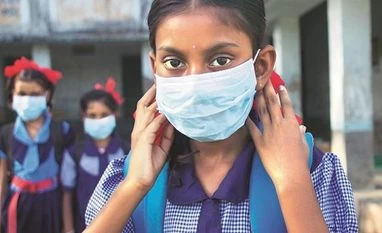The daily fresh Covid-19 case count has remained below the 5,000 mark in India since September 23. In fact, during the past 24-hours, some 176,357 new Covid-19 cases have been reported across the globe, shows World Health Organisation (WHO) data.
So far, the world has cumulatively reported 615 million Covid-19 cases since the pandemic broke out, and 65.24 million deaths, the WHO said. Several countries have started to relax the mandatory mask rules; life is almost back to the pre-Covid19 ‘normal’.
But is the end in sight?
Experts tend to suggest that the upcoming winter months will play a crucial role before the world can officially announce the ‘end of the pandemic’.
K Srinath Reddy, President, Public Health Foundation of India, said, "Though the case count has declined, we should wait till year-end to see if a new variant is emerging with greater immune-escape prowess. If Omicron lineage continues to keep other variants at bay and is seen to cause mild illness only, we can review the recommendation on masks early next year. By that time, we will also have more data on whether or not Omicron frequently causes Long Covid among those infected by it.”
Italy scrapped the mask-rule in public transport last week; UAE is scrapping the mask requirement rule after almost two and a half years – the world is moving away from even the most basic Covid-19 precautions as the disease gradually becomes more a flu-like condition. Some experts have, in fact, batted for not mandatorily wearing masks in open spaces.
Mid-September, WHO director general Tedros Adhanom Ghebreyesus said that the world has never been in a better position to end the Covid-19 pandemic, in his most optimistic outlook in the last two and half years. "We are not there yet. But the end is in sight," Ghebreyesus had told reporters.
But, experts are cautious about calling it an ‘end’. In fact, after US President Joe Biden declared the ‘pandemic is over’ in a television interview last month, he drew criticism from experts in his own country who called it ‘premature and harmful to the country’s Covid-19 response’.
Experts in India also seem to agree. Amulya Nidhi, public health expert and the national co-convener of the Jan Swasthya Abhiyan (JSA) told Business Standard, “The pandemic is still going on and if we learn from global experiences still preventive measures is the focus of many countries. There is no harm in using masks and we must continue all the preventive measures.”
He adds that “In India in the last three months vaccination drives are also slow which is not a good indication. The government should continue its efforts in vaccination drives and making masks compulsory in public places.”
Experts point out that the virus will continue to mutate and important variants will continue to emerge for the next few years.
“This does not mean that the pandemic will continue for the next few years. Surveillance needs to be strong to pick up any significant mutation which can lead to spikes in infection,” says Anish T S, associate professor of community medicine at Government Medical College, Manjeri in Kerala
Anish feels that whether or not the pandemic has ended varies – an economist will look at it differently while a clinician will have a different perspective. “If the infection in circulation is not a threat to the lives of the majority of the population, then economists will say that let’s not harm a country’s economy to save the lives of only a few. While a clinician will tend to look from an infection point of view,” he says.
He also adds that the vaccine makers lobby would also tend to keep Covid19 relevant and the fear alive. Sample this: right after President Biden said ‘pandemic is over’, the shares of Moderna, BioNTech, Novavax fell as much as 9 per cent, while Pfizer dropped by 2 per cent in the bourses.
Some experts, however, feel that the pandemic has ended. For example, Dileep Mavlankar, director, Indian Institute of Public Health and former professor of IIM Ahmedabad felt, “Pandenic has ended. But now it is endemic like any other flu like illness is my humble opinion. But we must improve the data surveillance system for diseases and deaths.”
The public in general now does not need to be notified with daily case counts anymore, but the epidemiologists, public health experts need to monitor the graph continuously, said Anish TS.
The head of a vaccine making company spoke on grounds of anonymity; “Covid19 vaccines are no longer a big business opportunity. However, they would continue to remain relevant for many years to come, and vaccine makers would continue research to come up with newer versions of these vaccines.” He added that nasal vaccines and pan-coronavirus vaccines will be the vaccines to look for in the future as these will reduce transmission (protecting the vulnerable) and also give broad-spectrum protection against coronaviruses.
“Coronaviruses and other respiratory viruses will continue to bother us, and thus vaccines will remain relevant. The pandemic has woken the world up to the potential of adult vaccination,” he said.
Covid-19 continues to kill and long Covid-19 remains a concern. Dr Eric Fegl-Ding, a reputed US health economist, took to Twitter to say: “Heck no. With all due respect, @JoeBiden — you’re wrong. Pandemic is not over. Almost 3,000 Americans are dying from #COVID19 every single week. A weekly 9/11 is a very big deal. Don’t even get me started on #LongCOVID—wreaking havoc on millions more," he tweeted a few days back.
Unlock 30+ premium stories daily hand-picked by our editors, across devices on browser and app.
Pick your 5 favourite companies, get a daily email with all news updates on them.
Full access to our intuitive epaper - clip, save, share articles from any device; newspaper archives from 2006.
Preferential invites to Business Standard events.
Curated newsletters on markets, personal finance, policy & politics, start-ups, technology, and more.
)